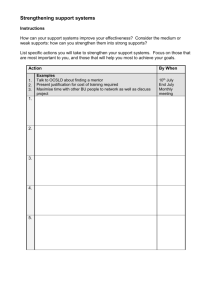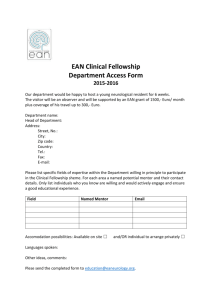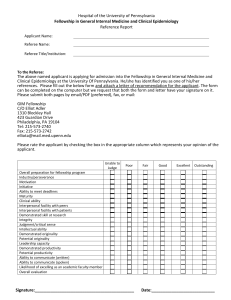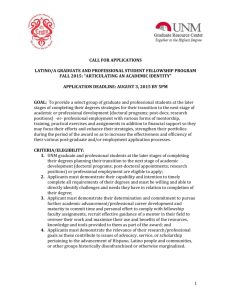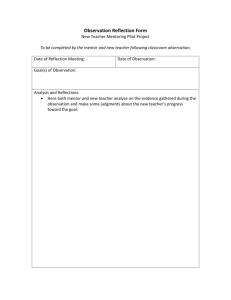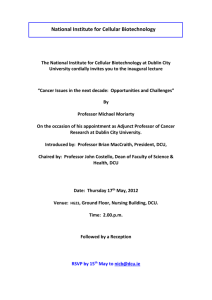DCU Info Session 291015
advertisement
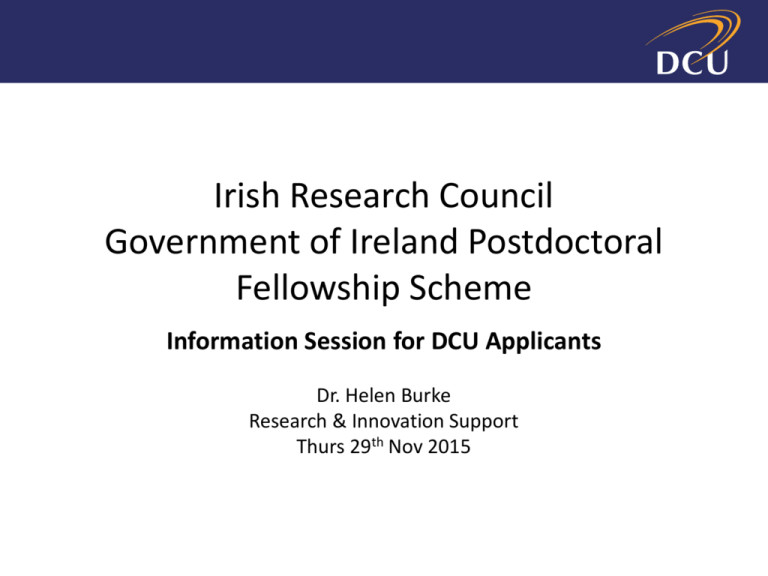
Irish Research Council Government of Ireland Postdoctoral Fellowship Scheme Information Session for DCU Applicants Dr. Helen Burke Research & Innovation Support Thurs 29th Nov 2015 Overview • 12 or 24 month fellowship for excellent early stage researchers to carry out a research project • Any discipline • Start date 1st Oct 2016 • Award: – Salary of €31,275 p/a (plus PRSI and pension) – €5k direct research support expenses • Consumables, travel, training, books, publishing costs etc. Eligibility Must: • Have been awarded PhD between 28th Feb 2011 and 29th Feb 2016. – Or have submitted thesis and have examiners appointed by 24th Nov 2015 and viva/thesis defence will be held before 29th Feb 2016 • Be authored or co-authored of a published peer-reviewed research publication – Or provide thesis table of contents plus one thesis chapter plus one further sample of written work Must not: • Hold a permanent contract with a HEI • Have been employed as a PD for more than 5 years at 29th Feb 2016 • Have held an IRC GOI PD Fellowship or Enterprise Partnership Scheme PD Fellowship • Have applied more than once before (i.e. can only apply twice) Proposal Submission • Submit proposal via IRC online application system – Applicant, mentor and referee details – Applicant track record • Qualifications, work experience, publications, outputs, awards etc. – Proposed research – Career training and development plan – Ethical and sex/gender dimension – Financial justification Submission Process • Register as applicant on IRC online system (OLS) – – – – • https://irishresearch.smartsimple.ie/s_Login.jsp Enter information and save drafts No changes possible after submission HEI where will be based Referees – Applicant enters referee email address and OLS sends referee login details and prompt to complete referee form • Academic Mentors – Applicant selects from drop-down menu – If DCU Academic Mentor not listed, send request to Helen Burke, RIS to add – Academic Mentor receives email from IRC after application submitted prompting to access OLS and complete Academic Mentor form • • Recommend work offline on the Indicative Application Form and copy and paste into OLS Submit proposal (indicative application form) to IPAS by 4pm Wed 18th Nov to get Research Office Endorsement – http://www.dcu.ie/internal/research/tracking.php3 • • Complete application on OLS by 4pm Tues 24th Nov and hit submit to send to Research Office Research Office will submit to IRC Assessment Process Evaluation 1. Track Record Research experience (based on academic CV), trans-national mobility, intersectoral mobility, scientific/practical/ management experience Research results (publications, invited contributions, patents, teaching, monographs, data sets etc.) Evidence of Match between the independent thinking researcher’s profile and leadership and the project qualities 5.5 Research Achievements Research Awards 8. Relevant Work Experience 9. Publications & Other Research Outputs – 5 peer reviewed publications plus 15 other outputs 5.5 Research Achievements 8. Relevant Work Experience 9. Publications 8. Relevant Work Experience 6. Proposed Research (Methodology, specialist knowledge) • Maximise use of Referee and Academic Mentor forms 2. Training and Career Development Clarity and quality of objectives in the career development plan, specific training activities have been scheduled. Potential acquisition of new research related and transferable skills. Skills relevant to employment outside the traditional academic sector. Potential to acquire Impact of the new knowledge. proposed fellowship on the applicant’s career path: potential to reach a position of professional maturity, diversity and independence 7. Short and long term career goals Specialist knowledge 7. Research training Complementary skills training Non-academic sector involvement? 5.5 Research Achievements 8. Relevant Work Experience • • • • • Make clear the impact this fellowship will have on your career – keeping in mind IRC goals Input from Mentor critical – must be joint effort Maximise use of Referee and Academic Mentor forms DCU Researchers Development Programme & Career Framework Additional localised/specialist/tailored training Not just training – must be a career plan 3. Quality of the Research Project Research quality, ethical and sex /gender issues, Interdisciplinary / multidisciplinary aspects of the proposal Potential to advance fundamental understanding and/or potential impact and addressing socioeconomic needs Originality (relationship to the ‘stateof –the-art’) and innovative nature of the project Suitability of the Feasibility of proposed the project methodology and approach for the project, short and long term research objectives 6. Proposed research 10. Ethics 11. Sex/gender 6. Demonstration of significant development Dissemination and potential impact Conferences, publications, open access DORAS, potential IP – discuss with Invent 6. Relationship to state of the art 6. Methodology (be specific) Description of topic 6. Research schedule, GANTT chart Reasons for choosing the host Resources for project Supports for settling in Track record 4. Quality of the Host Organisation/ Implementation of the Fellowship Suitability and Quality of the Host Organisation(s): reputation of the Mentor; support provided (e.g. equipment and facilities); (inter) national linkages with appropriate partners. Host expertise in developing experienced researchers in the field; capacity to provide mentoring, facilitation of the career development and training plan. Ability of Host Organisation(s) to allow full implementation of all aspects of the fellowship, such as the provision of all necessary facilities for the fellow to carry out the project. Ability of Host Organisation(s) to assist the fellow in integrating in their new research environment 6. Proposed Research 7. Training & Development plan 7. Training & Development plan 6. Reasons for choosing DCU and your mentor Description of specialist knowledge 6. Proposed Research 7. Training & Development plan • Academic Mentor forms particularly important Feedback Reports – Track Record “not in well-recognised journals”, “no notable scholarships, Fellowships or awards” - Track record very important. Ensure you stand out. Eligibility of one publication unlikely to be sufficient to compete. “lots of valuable non-academic research experience” - Experience doesn’t have to be traditional “difficult to judge whether s/he would be able to meet the demands of completing a book” - Be clear and convincing. Provide sufficient information. Risk mitigation. Be a safe bet. Feedback Reports – Training & Development Plan “too general”, “vague”, “more evidence of ‘added value’ or innovative elements of supports”, “light in terms of specifics”, “more significant or tailored career development pathway could have been put in place”, “uninspired”, “good but not outstanding” - Be specific. Include DCU supports but also tailored and specialised. Joint effort of mentor and applicant in writing this essential. Be innovative. Non-standard but relevant e.g. conference organisation, co-creation of courses, media training etc. Ensure consistency within an overall career plan. How do you actually want to develop? What are your real career and developmental goals? Feedback Reports – Quality of Research Project “too technical”, “uses specialist language” - Write for a non-technical audience. Assessors will not be experts in your field. Use jargon-free language. Keep prose simple and precise. Do not write in essay mode. Use the language from the IRC call documentation. “unclear why X chosen as publisher” - Make sure all elements of the proposal match up. Aim high with publisher if you’re stating research is world-class and track record shows you can achieve this. “so what?”, “interdisciplinary”, “topical”, “critical issue” - Must convince assessors that IRC should spend their limited funding on this research rather than something else. Topic must be of relevance. Make it clear right at the start what you’re going to do and convince the evaluator of the importance and potential impact of the work on your career and on society. Who cares if this research is carried out or not? What will the impacts be, and on whom? How does your research address current and future challenges (societal/cultural/economic)? How will you disseminate the findings? What will the outputs be? Feedback Reports – Host Organisation/Implementation “relevant experience”, “distinctive strengths” v’s “does not make strong case”, “information vague” - Must make a strong case for match between both applicant and project with both Mentor and Host Organisation. Don’t be vague. Use specifics. Specialised. Refer to experience in field of research, in supports etc. Show effort put in to career plan. Demonstrate added value for both the Fellow and the Host. Feedback Reports – Assessors are Human “The candidate clearly states that this re-writing for publication is ‘not a significant development of the existing work’, but could one expect a little bit more than just publishing work from the thesis” - Applicant adhered to the guidelines. However, Assessors review a huge volume of proposals with a strict deadline and all in their free time (commuting to work, at home on the kitchen table, waiting in an airport lounge etc.). In these circumstances, with only a few minutes to assess each proposal you have to stand out compared to the other submissions. The other candidates promised more. Need to do some level of extra research, not just rewrite your PhD into book format. Assessor 1: “Objectives sensible and achievable...are they really ambitious enough?” Assessor 2: “I have concerns about the feasibility of the project” - Same proposal viewed differently by different Assessors. Whatever you decide to do, be convincing. Use track record (e.g. applicant and/or mentor have achieved this level of output previously), project plan (e.g. sketch out timeline for research and writing per book chapters) etc. to convince. Final Take Home Message • IRC is looking for innovative, future ERC candidates and world leaders • They want you to solve current and future challenges • They want you to be brilliant and they want to be able to claim you • From your research and career they’ll need sound bites, press releases etc. • Give this to them. Convince them you’re a sure bet and will deliver what they need. Help them achieve their objectives. Actions • • • • • • • Confirm eligibility Contact Academic Mentor & Referees Visit DCU resources webpage Read call documentation Work out project and training plan Submit application to IPAS by Wed 18th Nov Submit application via OLS by Tues 24th Nov Further Info • IRC Webpage – http://www.research.ie/scheme/2016-government-irelandpostdoctoral-fellowship • RIS website – http://www4.dcu.ie/researchsupport/ircpd-proposal-prep.shtml • Dr. Helen Burke, Research & Innovation Support – Answer queries, submit to IRC FAQ, proposal review – Helen.burke@dcu.ie, x8003 • Dr. Katya McDonagh, Research and Engagement Support Officer – HSS proposal review – Ecaterina.mcdonagh@dcu.ie, x6778
